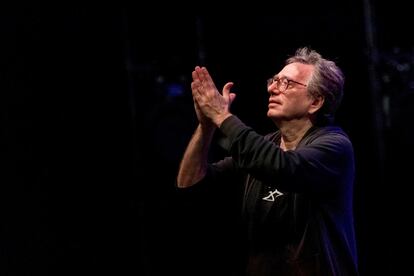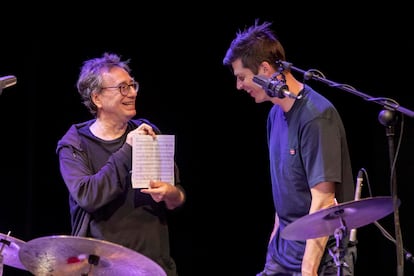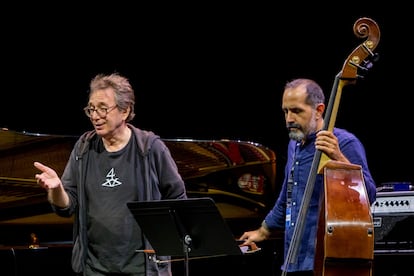John Zorn, the expansive universe of a jazz genius
The charismatic American composer and saxophonist just concluded a leading role at the 59th edition of San Sebastián International Jazz Festival

He’s about to turn 71, although you wouldn’t believe it. Whether he’s introducing the musicians who bring his compositions to life on stage, or playing his alto sax in a flamboyant and exuberant manner, John Zorn seems as active and lively as he was decades ago.
Perhaps he’s aging gracefully because of his unbridled activity. He composes and publishes music inordinately. His catalogue, which contains hundreds of recordings, grows by dozens every year. He has no children, nor does he ever go on vacation. Zorn, simply, works and works, composing, conducting and creating new projects, regularly renewing his title as the most prolific living American composer.
Despite this professional hyperactivity, hearing him live isn’t so easy. Zorn is an exclusive and demanding artist who doesn’t just let himself be hired out. With him, everything is a carefully considered project and a special proposal, designed for each moment and each place, according to his wishes.
In 2013, he hosted 12 concerts with the Masada Quartet and the Electric Masada, two different musical ensembles with rotating personnel that he’s led since the 1990s. In 2015, he played alongside Bill Laswell and Dave Lombardo. And, in 2019, he hosted a marathon of 14 concerts in just two days, with a variety of different bands. To this record, he’s now added the residency that he just completed at the 59th edition of Spain’s San Sebastián International Jazz Festival, with six concerts spread over three days. Zorn performed alongside several of the most important musical groups that he’s worked with in recent years.

A universe that expands
These concerts have been the most memorable musical displays that the festival has ever had. While a varied and high-quality program was put together, Zorn offers one of the peaks of universal creative music. It’s natural that his compositions stand out in almost any jazz set, no matter how excellent it may be. In addition to his unrestrained creativity, the most fascinating thing about the American composer is that, no matter how much he produces, the quality of his work rarely falls below levels that are within the reach of very few creators.
Both in his albums and in his concerts, Zorn’s music is supported by his pen and leadership, just as much as by the musicians he chooses for each specific proposal. One of the constants in his work is that he’s always surrounded by a group of trusted musicians who respond to his particular artistic desires. They’re all part of the expanding Zorn universe, which — while being a faithful reflection of the creator and his idiosyncratic personality — is also an extraordinary example of the talent of a handful of performers who are always among the most brilliant in the world.
Zorn doesn’t mince words: his music isn’t for just anyone to perform. It’s reserved for whomever he requires at any given moment. His bench has been deepening in recent years. In the six concerts that have been presented in the Spanish city of Donostia-San Sebastián, several of the most brilliant names on Zorn’s roster have been heard. These include prodigious pianist Brian Marsella, young guitar superstar Julian Lage, veteran organist John Medeski, drummer Ches Smith, guitarist Matt Hollenberg, or the drummer Kenny Grohowski, among others. Together and mixed in different formations, they make up ensembles such as Incerto, Simulacrum or Chaos Magick, groups that have been producing much of Zorn’s most important music in recent years.
Despite some overlapping members, each of these formations — carefully assembled by Zorn — is inseparable from the music it performs. You cannot replace one guitarist with another, or have Marsella play an acoustic piano instead of a Fender Rhodes keyboard. In a way, it’s as if composition and interpretation were one in Zorn’s music, making it essential that both be united at all times, so that the complete experience is as the composer demands. In a bold yet illustrative comparison, it’s as if Beethoven went on tour together with Emil Guilels, or Chopin with Vladimir Horowitz, or Mozart with Walter Gieseking: their piano performances would sound like the particular version chosen by the composer on each occasion. Zorn assembles the pieces and draws the parameters, but once his musicians begin to play, his creations take flight through their own individual interpretations.
At the same time, trying to separate Zorn as a performer from his role as a composer or director is unfeasible. While his presence as a saxophonist has been diminishing in recent times and has been limited to very specific projects, his musical universe cannot be understood without taking into account all of his creative facets. Furthermore, listening to Zorn as an instrumentalist continues to be the most direct and resounding way of connecting with the most primal aspects of his personality. This offers a listener the opportunity to access not only his ideas, his overwhelming compositional ability and his forceful artistic direction, but also the carnal and most synthetic expression of his language.

A vibrant concert
For this reason, the concert that closed the San Sebastián International Jazz Festival was, without a doubt, the most eagerly-awaited of Zorn’s residency. It was the only one in which the saxophonist stepped onto the stage to play the alto sax, leading one of his main ensembles: the Masada New Quartet. In it, Zorn revisits the music he produced with one of his most popular groups, Masada, in which he combined the tradition of Eastern European Jewish folk music with the free jazz of the classic trumpeter Don Cherry (1936-1995) and saxophonist Ornette Coleman (1930-2015).
Thirty years after the first recordings of the original group, Zorn finally presented this new incarnation of Masada in Spain, in a vibrant concert that left the audience breathless from start to finish. Accompanied by Lage on guitar, Peruvian bassist Jorge Roeder and veteran drummer Kenny Wollesen, Zorn demonstrated that his ability as a saxophonist remains at the highest level. And, above all, that he’s still capable of going on stage and having a great time, like a kid, while creating extraordinary music. Perhaps that’s the secret behind his youthful appearance.
Sign up for our weekly newsletter to get more English-language news coverage from EL PAÍS USA Edition
Tu suscripción se está usando en otro dispositivo
¿Quieres añadir otro usuario a tu suscripción?
Si continúas leyendo en este dispositivo, no se podrá leer en el otro.
FlechaTu suscripción se está usando en otro dispositivo y solo puedes acceder a EL PAÍS desde un dispositivo a la vez.
Si quieres compartir tu cuenta, cambia tu suscripción a la modalidad Premium, así podrás añadir otro usuario. Cada uno accederá con su propia cuenta de email, lo que os permitirá personalizar vuestra experiencia en EL PAÍS.
¿Tienes una suscripción de empresa? Accede aquí para contratar más cuentas.
En el caso de no saber quién está usando tu cuenta, te recomendamos cambiar tu contraseña aquí.
Si decides continuar compartiendo tu cuenta, este mensaje se mostrará en tu dispositivo y en el de la otra persona que está usando tu cuenta de forma indefinida, afectando a tu experiencia de lectura. Puedes consultar aquí los términos y condiciones de la suscripción digital.








































